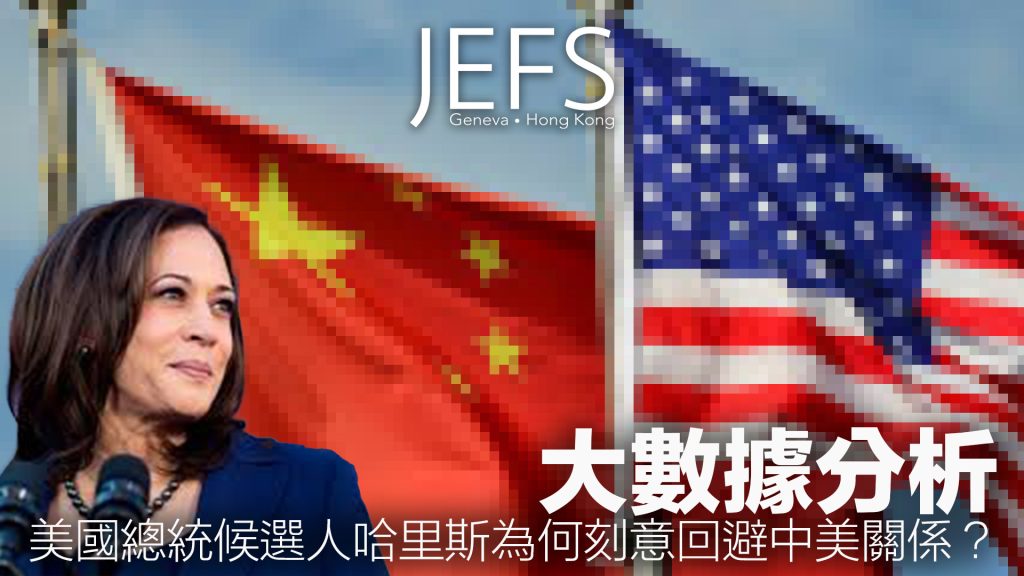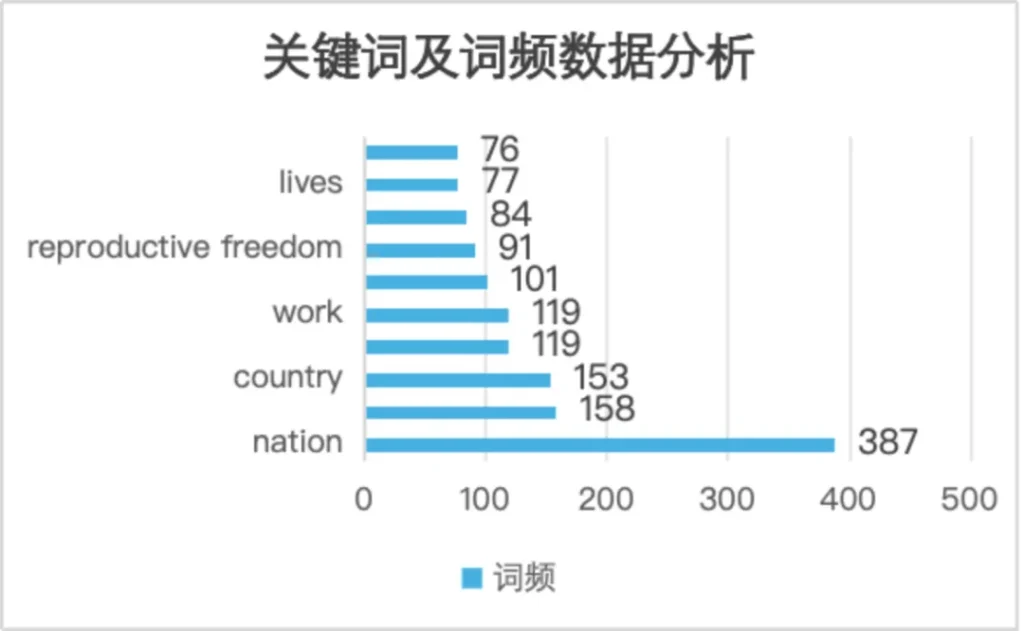
通過大數據和人工智能模型挖掘美國現任副總統、民主黨總統候選人卡瑪拉·哈里斯(另譯賀錦麗,下稱哈里斯)的社交媒體,並對過去1年約870萬條相關信息分析可發現,哈里斯刻意對當前火熱的中美關係議題進行冷處理。哈里斯現已拋出「機會經濟」的宏觀調控經濟政策,希望助力美國中產和振興經濟,此舉或許意味著她未來如當選,暫不會與中國在經貿領域開闢新戰線。
網民當前對哈里斯的負面情緒佔比達34.6%,遠高於正面情緒的10.8%。為扭轉局面,哈里斯作為女性候選人,在社交媒體有意更多探討女性選民關注的話題,冀以此爭取更多來自女性選民的好感和支持。
美國副總統哈里斯中途接替拜登,於2024年8月5日獲得民主黨候選人提名,代表民主黨參加今年11月舉行的美國總統選舉。倉促加入總統選舉戰團的哈里斯,如成功當選下任美國總統,可能會對中國採取哪些措施?對此,我們通過挖掘2023年8月21日至2024年8月20日期間與哈里斯相關的社交媒體X(原稱Twitter)的推文之後,採用數據模型進行定量分析,並結合機器學習、情緒分析等人工智能模型,以研究和預測哈里斯的有關政策思路。
首先,我們選取了哈里斯在社交媒體X的兩個官方賬號@KamalaHarris和@VP作為研究目標。從2023年8月21日至2024年8月20日期間,哈里斯共發佈了2744條推文,日均發文量為7.5條,整體來看每日發文數量波動較小。即便在2024年7月21日美國總統拜登宣佈退選後,哈里斯的發文數量也未出現顯著波動。

從推文的回複數量來看,2023年8月21日至2024年8月20日期間,約有超過864萬條推文回復。我們關注到從今年7月21日開始,推文回復量顯著增加,顯示出拜登退選後,大量選民才開始關注哈里斯的推特賬號。

令人意外的是,哈里斯發佈的2744條推文當中,並無多少直接涉及中國的內容。縱使網民在推文的回復當中,「引導」她討論炙手可熱的中美關係議題,希望她能發表對中國的言論,哈里斯卻依然選擇冷處理。
究其原因,我們分析認為至少有以下兩個因素。
其一,哈里斯需要「隱形」。作為美國副總統,只要總統拜登能正常履行職務,面對重大議題,哈里斯哪怕有十八般武藝,也只能 「無聲勝有聲」,盡量不露鋒芒。
其二,哈里斯需要「藏拙」。相比美國的國務卿、國家安全顧問、國防部長和財政部長等內閣成員,哈里斯過去較少涉及對華事務,因此選擇作為拜登對華政策的追隨者,可避免「說多錯多」。
雖然哈里斯目前甘當拜登對華政策的「傳聲筒」,未來如當選下任美國總統,也非常有可能保留拜登對華政策的主體。但為更進一步瞭解哈里斯對中美關係的立場和觀點,我們也用人工智能模型分析和預判了哈里斯在一些公開場合的發言和媒體專訪內容,以此更全面地分析她在對華政策上的態度和策略,為本研究提供更完整的視角。
其一,哈里斯主張通過嚴格控制半導體出口和技術共享,限制中國科技發展。她曾在民主黨總統候選人提名演說中強調:「我們必須確保在太空和人工智能領域引領世界,確保美國,而不是中國,贏得21世紀的競爭。」她的言論,或顯示她如當選下任美國總統,很有可能繼續將科技競爭作為未來對華政策的一個關鍵領域。
其二,在經濟政策上,哈里斯則展現了與前任總統特朗普政府不同的姿態。她多次批評特朗普發起的貿易戰,認為過度依賴提高關稅的做法不僅未能重新平衡美中關係,反而對美國經濟造成了負面影響。她主張採取「去風險」而非「脫鈎」的方式,建議減少西方經濟體對中國的依賴,特別是在戰略性行業領域。這種立場顯示出她未來有可能與中國保持一定的經濟互動和合作。
其三,哈里斯對人權問題或將更加強硬。哈里斯曾與共和黨籍參議員盧比奧共同提出了一項兩黨法案,旨在促進香港的人權,並制裁涉嫌「破壞香港基本自由和自治」的官員;她也是《維吾爾人權政策法》的共同發起人之一,該法案授權美國政府對在新疆所謂的「侵犯人權」的外國個人和實體實施制裁。這些立法行動或表明她未來有可能在有關香港人權、制裁香港官員和新疆等議題上,將採取更強硬的立場和措施。
同時,我們在分析中也發現,在哈里斯最熱門的前50條推文(根據點贊、轉發和評論數的綜合衡量)當中,關於經濟復蘇與人民福祉(Economic recovery and people’s well-being)的話題被頻繁提及。
諸如「Work」 、「Families」、「Communities」、「Lives」等關鍵詞(如圖3所示),在哈里斯社交賬號推文中分別出現頻率為119、84、77和76次,或顯示出哈里斯對經濟復蘇和人民福祉的關注。其中,她在8月17日的推文中曾回憶兒時的成長經歷時,表示:「當生活成本上升時,這種情況只會變得更難。當我當選為總統時,我將把降低成本和增加所有美國人的經濟安全作為首要任務。」

哈里斯的推文內容頻繁出現上述關鍵詞,相信她是希望以創造就業機會、支持工薪家庭、改善社區條件和提高生活質量等議題,吸引那些在經濟議題上有訴求的選民。在她當前已公佈的宏觀經濟政策中,她還特別關注中產階級和工薪階層的需求,強調經濟政策的公平性和包容性——包括為首次購房者提供抵押貸款援助,為新生兒父母提供稅收抵免優惠,以及禁止雜貨店哄抬物價以幫助抑制通脹。她更計劃創造「一個機會經濟,讓每個人都有機會競爭,並有成功的機會」。
雖然另一總統候選人特朗普將哈里斯上述的「機會經濟」理念,批評為具有「共產主義」傾向,並認為這僅僅是一種競選策略,旨在局限地鞏固她在特定選民群體中的基礎支持,而非提出廣泛而有效的政策措施。然而,我們必須認識到,美國當前的經濟困境以及由此產生的社會矛盾正在逐漸加劇。
如果哈里斯當選下任美國總統,她將面臨解決國內經濟問題的巨大壓力。美國經濟形勢的嚴峻性已使她無法在處理對華政策時任意行事。因此,在面對需要緩和的局勢時,她可能會選擇更為謹慎和緩和的對華態度,哪怕是暫時的調整。當然,這種可能的暫時緩和,並非預示著美國未來不會與中國在經貿領域開闢新的戰線,而是將基於美國國內經濟和整體國家利益來權衡與考量。
在這樣的背景下,哈里斯如當選美國總統,可能會尋求更加務實和靈活的對華經濟政策。在確保國內經濟穩定和社會和諧的大前提下,她可能會更妥善處理作為美國重要貿易夥伴的中國的經貿關係,這一過程無疑將為未來的中美關係走向增添新的挑戰和機遇,同時也是對全球經貿格局的重要考驗和調整的過程。
總的來說,哈里斯在面對國內外經濟形勢和挑戰時,對華可能會採取更加審慎和務實的政策取向,以平衡國內外利益,促進經濟的穩定和持續發展。此舉可能意味著,美國短期內不會輕率地在經貿領域對中國進行重大變革或冒險行動,而是更加註重穩健和可持續性。
此外,我們在用人工智能情緒分析模型對有關哈里斯的推文的分析當中,發現了一個有趣的現象。在2023年8月21日至2024年8月20日期間,共有約845萬條關於哈里斯的推文評論,在這些評論中,負面情感佔比高達34.6%,中性情感佔比為44%,正面情感佔比只有10.8%,未涉及情感內容的佔比為10.6%。
網民對哈里斯有較高的負面情感,主要涉及對哈里斯的個人表現、表達能力、人格特質和過去個人私生活等的批評,以及在一些評論中,部分男性選民還會對哈里斯這一女性執政者身份產生質疑,或出於種族觀念排斥非裔政客執政。
我們在分析中還發現,哈里斯推文的回復中,女性用戶佔比為32%,高於總統拜登推文回復中的女性佔比29%。這表明,作為女性候選人,哈里斯在一定程度上更能吸引女性選民的關注。
為降低網民對她高達34.6%的負面情緒,我們發現哈里斯近期頻繁在社交媒體中使用Freedom(119次)、 Women(101次)、Reproductive Freedom(91次)此類主要圍繞選民自由、健康與權利保護等有利於討好選民的關鍵詞。在她的推文中,哈里斯還常以女性的視角進行呼籲,如在其7月29日的推文中曾公開抨擊前總統特朗普的禁令,並承諾:「現在,超過三分之一的美國生育年齡女性生活在有特朗普墮胎禁令的州。當我成為美國總統時,我將簽署一項法律,恢復和保護每個州的生殖自由。」哈里斯多次表達對保護女性生殖權利的立場,並批評既往政府在這些方面的政策。她呼籲立法來恢復和保護這些權利,這顯示出她試圖將自己定位為女性自由和權利的捍衛者,以此獲取更多女選民的支持。
海南大學一帶一路研究院
The analysis of social media related to Kamala Harris, the current Vice President of the United States and the Democratic presidential candidate, was conducted through big data and artificial intelligence models. Over the past year, approximately 8.7 million relevant pieces of information were analyzed, revealing that Harris has intentionally adopted a low-profile approach to the currently heated issue of U.S.-China relations. She has proposed a macroeconomic policy termed “opportunity economy,” aiming to support the American middle class and revitalize the economy. This move may suggest that, if elected in the future, she will not open new fronts with China in the economic and trade sector.
Currently, negative sentiment toward Harris among internet users accounts for 34.6%, significantly higher than the 10.8% of positive sentiment. To reverse this situation, Harris, as a female candidate, intends to explore topics that are of greater concern to female voters on social media, hoping to gain more goodwill and support from them.
Harris took over from Biden midway through the term and was nominated as the Democratic candidate on August 5, 2024, to represent the Democratic Party in the U.S. presidential election scheduled for this November. As she hurriedly joined the presidential race, if she successfully becomes the next President of the United States, what measures might she take regarding China? To address this, we conducted a quantitative analysis by mining tweets related to Harris on social media platform X (formerly known as Twitter) from August 21, 2023, to August 20, 2024. We employed data models, along with artificial intelligence models such as machine learning and sentiment analysis, to study and predict her relevant policy ideas.
First, we selected Harris’s two official accounts on social media X, @KamalaHarris and @VP, as our research targets. From August 21, 2023, to August 20, 2024, Harris posted a total of 2,744 tweets, averaging 7.5 tweets per day, with overall daily posting numbers showing little fluctuation. Even after President Biden announced he would not seek re-election on July 21, 2024, the number of Harris’s tweets did not show significant changes.
From the number of replies to tweets, there were over 8.64 million replies from August 21, 2023, to August 20, 2024. Notably, since July 21 of this year, the volume of tweet replies has significantly increased, indicating that many voters have begun to pay attention to Harris’s Twitter account following Biden’s announcement not to seek re-election.
Surprisingly, among the 2,744 tweets posted by Harris, very few directly addressed China. Even though internet users have attempted to “guide” her into discussing the hot topic of U.S.-China relations and hoped she would make statements regarding China, Harris has still chosen to take a low-profile approach.
We analyze that there are at least two factors contributing to this situation.
First, Harris needs to be “invisible.” As the Vice President of the United States, as long as President Biden can perform his duties normally, Harris must remain subdued on major issues. No matter how capable she is, she can only “speak silently” and try to avoid showing too much prominence.
Second, Harris needs to “hide her skills.” Compared to cabinet members such as the Secretary of State, National Security Advisor, Secretary of Defense, and Secretary of the Treasury, Harris has previously been less involved in China-related affairs. By choosing to follow Biden’s policies toward China, she can avoid the pitfalls of “saying too much and making mistakes.”
Although Harris currently acts as a “mouthpiece” for Biden’s China policy, if she were to be elected as the next President of the United States, it is very likely that she would retain the core elements of Biden’s approach toward China. However, to gain a deeper understanding of Harris’s stance and views on U.S.-China relations, we also analyzed her statements in public forums and media interviews using artificial intelligence models. This comprehensive analysis aims to provide a fuller perspective on her attitude and strategy regarding China policy.
First, Harris advocates for strict controls on semiconductor exports and technology sharing to limit China’s technological development. She emphasized in her Democratic presidential nomination speech: “We must ensure that we lead the world in space and artificial intelligence, ensuring that the United States, not China, wins the competition of the 21st century.” Her statements suggest that if elected as the next U.S. President, she is likely to continue prioritizing technological competition as a key area in future China policy.
Second, in terms of economic policy, Harris has shown a different stance compared to former President Trump’s administration. She has criticized the trade war initiated by Trump multiple times, arguing that the over-reliance on raising tariffs not only failed to rebalance U.S.-China relations but also had a negative impact on the U.S. economy. She advocates for a “de-risking” approach rather than “decoupling,” suggesting a reduction in Western economies’ dependence on China, especially in strategic industries. This position indicates that she may seek to maintain a certain level of economic interaction and cooperation with China in the future.
Third, Harris may take a tougher stance on human rights issues. She has co-sponsored a bipartisan bill with Republican Senator Marco Rubio aimed at promoting human rights in Hong Kong and sanctioning officials suspected of “undermining basic freedoms and autonomy in Hong Kong.” She is also one of the co-sponsors of the Uyghur Human Rights Policy Act, which authorizes the U.S. government to impose sanctions on foreign individuals and entities involved in alleged “human rights violations” in Xinjiang. These legislative actions may indicate that she is likely to adopt a more hardline position and measures regarding human rights issues in Hong Kong, sanctions on Hong Kong officials, and matters related to Xinjiang in the future.
At the same time, our analysis also found that among Harris’s top 50 most popular tweets (measured by a combination of likes, retweets, and comments), the topic of economic recovery and people’s well-being was frequently mentioned.
Keywords such as “Work,” “Families,” “Communities,” and “Lives” appeared in her tweets with frequencies of 119, 84, 77, and 76 times, respectively (as shown in Figure 3), indicating Harris’s concern for economic recovery and the well-being of the people. In a tweet on August 17, she recalled her childhood experiences, stating, “When the cost of living goes up, it only makes things harder. When I am elected as President, I will make lowering costs and increasing economic security for all Americans my top priority.”
The frequent appearance of these keywords in Harris’s tweets suggests that she aims to attract voters who are concerned about economic issues by focusing on topics such as job creation, supporting working families, improving community conditions, and enhancing quality of life. In her currently announced macroeconomic policies, she has also paid particular attention to the needs of the middle class and working-class individuals, emphasizing the fairness and inclusivity of economic policies—such as providing mortgage assistance for first-time homebuyers, offering tax credits for new parents, and prohibiting grocery stores from price gouging to help curb inflation. She further plans to create “an opportunity economy where everyone has the chance to compete and succeed.”
Although another presidential candidate, Trump, has criticized Harris’s concept of “opportunity economy” as having “communist” tendencies and believes it is merely a campaign strategy aimed at consolidating her support among specific voter groups rather than proposing broad and effective policy measures, we must recognize that the current economic difficulties in the United States and the resulting social conflicts are gradually intensifying.
If Harris were to be elected as the next President of the United States, she would face tremendous pressure to address domestic economic issues. The severity of the U.S. economic situation would prevent her from acting arbitrarily in formulating policies toward China. Therefore, when confronted with situations that need to be eased, she may opt for a more cautious and moderate approach to China, even if it involves temporary adjustments. Of course, such a possible temporary easing does not imply that the U.S. will not open new fronts with China in the economic and trade sectors in the future; instead, it will be based on weighing and considering domestic economic conditions and overall national interests.
Against this backdrop, if Harris were elected President, she might pursue a more pragmatic and flexible economic policy toward China. Under the premise of ensuring domestic economic stability and social harmony, she may handle trade relations with China—an important trading partner of the U.S.—more effectively. This process will undoubtedly add new challenges and opportunities to the future trajectory of U.S.-China relations and will also be a significant test and adjustment for the global economic landscape.
In summary, when facing domestic and international economic conditions and challenges, Harris may adopt a more cautious and pragmatic policy orientation toward China to balance domestic and foreign interests and promote economic stability and sustainable development. This could mean that the U.S. will not recklessly undertake significant changes or risky actions in economic and trade relations with China in the short term, but will instead focus on stability and sustainability.
Additionally, in our analysis using artificial intelligence sentiment analysis models on tweets related to Harris, we discovered an interesting phenomenon. From August 21, 2023, to August 20, 2024, there were approximately 8.45 million comments about Harris, with negative sentiment accounting for 34.6%, neutral sentiment for 44%, and positive sentiment for only 10.8%. The proportion of comments not involving sentiment was 10.6%.
The high level of negative sentiment toward Harris among internet users mainly involves criticisms of her personal performance, expression abilities, personality traits, and past personal life. In some comments, certain male voters also questioned her identity as a female leader or expressed racial biases against an African American politician.
We also found that among the replies to Harris’s tweets, female users accounted for 32%, higher than the 29% of female replies to President Biden’s tweets. This indicates that, as a female candidate, Harris is able to attract the attention of female voters to a certain extent.
To reduce the 34.6% negative sentiment from internet users, we noted that Harris has recently been using keywords favorable to appealing to voters, such as “Freedom” (119 times), “Women” (101 times), and “Reproductive Freedom” (91 times), which primarily revolve around voter freedom, health, and rights protection. In her tweets, Harris often appeals from a female perspective. For example, in a tweet on July 29, she publicly criticized former President Trump’s ban and pledged: “Now, over a third of women of reproductive age in America live in states with Trump’s abortion bans. When I become President of the United States, I will sign a law to restore and protect reproductive freedom in every state.” Harris has repeatedly expressed her stance on protecting women’s reproductive rights and criticized past administrations’ policies in these areas. She calls for legislation to restore and protect these rights, indicating her attempt to position herself as a defender of women’s freedoms and rights in order to gain more support from female voters.
Professor Leung Hoi Ming
Dean of Hainan University Belt and Road Research Institute


